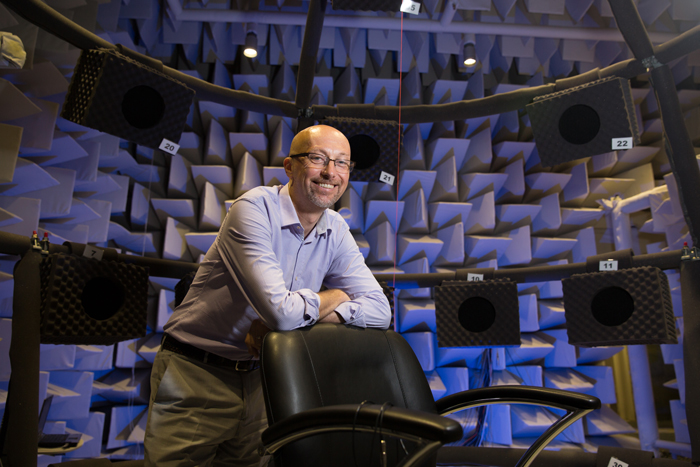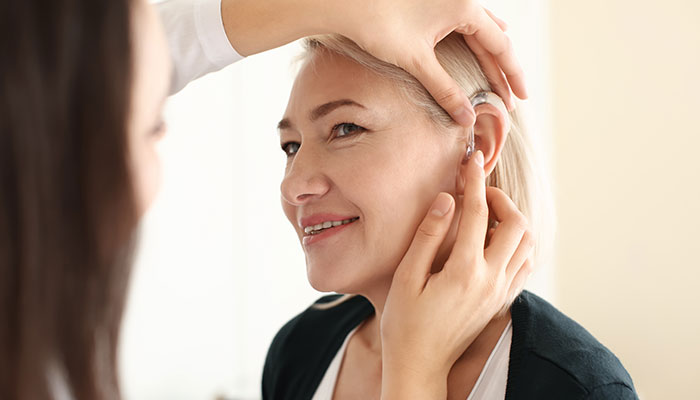
Much of the hearing loss in our community can be prevented if people take more precautions to protect their hearing, says auditory neuroscientist Professor David McAlpine, who heads the Australian Hearing Hub at Macquarie University.
About one in six Australians currently has some form of diagnosed hearing impairment, and that rate is rising as our population ages.
However, an even higher number of people may have functional hearing loss, where they struggle to hear conversations in a noisy environment.
McAlpine says that hearing loss isn’t just a condition of ageing, and much of it is preventable.
About 5 per cent of people experiencing tinnitus find it’s very debilitating, severely affecting their emotional health, their relationships and their ability to work.
Greatly improved regulations around noise at work have reduced the occupational causes of hearing loss in recent decades. But rates of hearing impairment in the community haven’t dropped significantly.
McAlpine believes that’s because there’s a rising impact of hearing damage from 'noise at play'; too-loud entertainment at concerts and sporting events and high volumes on personal headphones have triggered a rise in tinnitus and associated 'hidden hearing loss' in young Australian adults.
McAlpine is one of the many people in Australia with tinnitus – hearing phantom ringing sounds after noise exposure – but his own condition is mild.
“About 5 per cent of people experiencing this condition find it’s very debilitating, severely affecting their emotional health, their relationships and their ability to work,” he says.
Reduce the sound around you
Professor McAlpine says that we live in social environments that can be very noisy, but we can take steps to protect ourselves.
“Take a ‘noise diet’ – give your ears a break from constant noise,” he says.
He advises people to wear earplugs to gigs and large sporting events, and turn down their headphones.
“Protective earplugs can now give hearing protection by reducing the quantity but not the quality of the sound,” he explains.
Being hard-of-hearing at 55 when life expectancy was 65 was bad enough, but children born today could live to be 100 years old.
There’s currently little regulation on noise levels at entertainment venues – but it’s here that noise exposure can have long-term effects.
“Safe limits for work would exclude you from being in an environment where noise is at 100 decibels after 15 minutes – but people stay for two hours at a gig with noise levels at that rate and higher, and there’s no licensing controls or responsibility taken for the safety of people attending.”
If venues reduced sound levels to 94dB, you could safely listen for up to an hour; reduce it to 91dB, and up to two hours' exposure is the upper limit of safe listening, he says.
“Most people can’t tell the difference, in terms of their enjoyment of the music – but we have got to this point where we can overamplify without distorting sound, or we’re using distortion as a musical device.”
Hearing research: where’s it headed
McAlpine points out that communication is a vital aspect of what it means to be human; and hearing is critical to communication.
Deafness can have profound effects on people because it reduces our ability to engage in society, impacting on education, employment, life chances and wellbeing.
He says that increasing longevity, no change to our risky listening behaviour, and few new therapies emerging for hearing loss could lead to a 'tidal wave' of hearing problems over the next 20 years.
“Being hard-of-hearing at 55 when life expectancy was 65 was bad enough, but children born today could live to be 100 years old,” he says.
“Spending half of that time with a degenerating communication disorder and one that likely impacts on cognitive decline into dementia – is a sobering thought and one we have to force ourselves to face up to.”
The solution, he says, is pushing for behavioural change at times when it seems most difficult to do so.
“For example, in our teens and 20s we need to reduce our exposure to ultimately damaging sounds, and in our 50s and 60s when the effects of hearing become apparent, we need to make sure solutions (such as hearing aids) are taken up and then aren’t abandoned before they have a chance to demonstrate their worth.”
Despite a somewhat gloomy prognosis, however, McAlpine says he is optimisitic for the future.
“Cochlear implants are a transformative technology for hundreds of thousands of people worldwide, while new drug-based therapies for hearing problems currently undergoing clinical trials demonstrate that hearing loss is no longer the problem it once was.”
He says that the work by Macquarie researchers at the Australian Hearing Hub will have positive impacts on the universal problem of hearing loss.
“I am proud to be entrusted with helping deliver that impact," he says.
Professor David McAlpine is an ARC Australian Laureate Fellow, Department of Linguistics. Learn more about the Australian Hearing Hub and the services it offers.
First published 1 April 2018



